How Often Should You Pressure Wash Your House?
Introduction
Maintaining the exterior of your home is essential for its longevity and curb appeal. One of the most effective ways to keep your house looking fresh and clean is through pressure washing. But how often should you pressure wash your home to ensure it stays in top condition? Let’s dive into this comprehensive guide to find out!
Explanation of pressure washing
Pressure washing is a cleaning method that utilizes high-pressure water spray to remove dirt, grime, mold, and other contaminants from surfaces. It is commonly used for cleaning exterior surfaces of buildings, driveways, decks, and sidewalks. The high-pressure water stream effectively dislodges and washes away stubborn stains and buildup, leaving surfaces looking clean and refreshed.
Importance of maintaining a clean house exterior
Maintaining a clean exterior is essential for preserving the appearance and integrity of your home. A well-maintained exterior not only enhances curb appeal but also protects against damage caused by dirt, mold, and other contaminants. Regular pressure washing helps to prevent the buildup of these harmful substances, prolonging the life of your siding, paint, and other exterior materials.
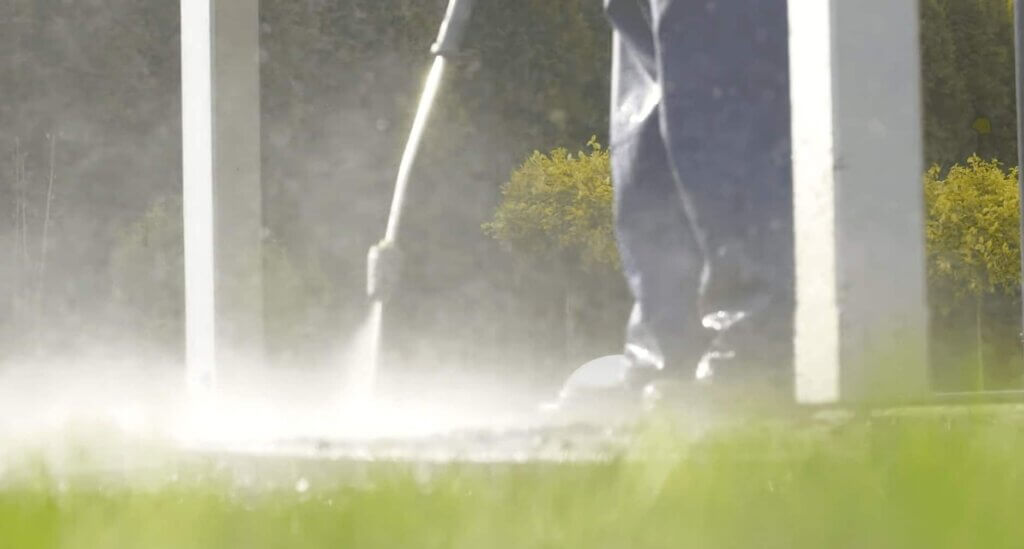
Why Pressure Washing is Important
Pressure washing goes beyond aesthetics; it’s about preserving the integrity of your home. By removing built-up dirt, grime, mold, and mildew, you not only enhance the appearance but also prevent potential damage to your siding, paint, and other exterior surfaces. Regular pressure washing also helps safeguard your family’s health by eliminating allergens and harmful pollutants.
Benefits of Regular Pressure Washing
Regular pressure washing offers numerous benefits, including:
- Preserving property value: Regular cleaning maintains the value of your home by preventing permanent stains and damage.
- Preventing repairs: Removing dirt and debris prevents deterioration, saving you money on costly repairs in the long run.
- Enhancing curb appeal: A clean exterior boosts curb appeal, making your home more inviting and attractive.
- Promoting health and hygiene: Eliminating mold, mildew, and allergens creates a healthier living environment for your family.
Factors Influencing Pressure Washing Frequency
The frequency of pressure washing your house depends on factors such as climate, level of pollution, and the type of siding or exterior material. By considering these factors, you can establish a personalized maintenance schedule to keep your home clean and well-maintained throughout the year.
Climate Conditions
Areas characterized by high humidity, frequent rainfall, or significant temperature fluctuations often experience accelerated mold, mildew, and dirt accumulation, necessitating more frequent pressure washing to maintain cleanliness and prevent structural damage. The combination of moisture and temperature variations creates an ideal environment for these contaminants to thrive, making regular pressure washing an essential maintenance practice in such regions.
Type of Siding and Material
Different siding materials, including vinyl, brick, and wood, exhibit varying degrees of susceptibility to dirt accumulation and damage. By identifying the specific type of siding on your home, you can establish an appropriate cleaning schedule tailored to the material’s characteristics and maintenance requirements.
Surrounding Environment and Foliage
Homes nestled amidst abundant foliage often require more frequent cleaning due to the accumulation of dirt, pollen, and sap from surrounding trees and bushes. The dense vegetation can attract debris, requiring homeowners to invest additional time and effort into maintaining a clean exterior to preserve the aesthetic appeal of their property.
Frequency of Rainfall and Humidity
Areas characterized by frequent rain or high humidity levels are susceptible to mold and mildew growth due to the moisture-laden environment, necessitating regular pressure washing to maintain cleanliness and prevent structural damage caused by the proliferation of these organisms. The combination of persistent damp conditions and organic debris provides an optimal breeding ground for mold and mildew, making proactive cleaning efforts crucial for preserving surfaces and extending their longevity in such environments.
Recommended Frequency for Pressure Washing
Determining how frequently to pressure wash your house depends on factors like climate, surrounding vegetation, and the accumulation of dirt and grime. Typically, it’s advisable to aim for annual pressure washing to maintain your home’s appearance and prevent buildup that could lead to damage or deterioration over time.
Ideal Pressure Washing Schedule
For most homes, an annual pressure washing is sufficient to maintain cleanliness and prevent damage. However, certain factors may warrant more frequent cleanings, such as:
- High humidity: Homes in humid climates may benefit from bi-annual pressure washing to prevent mold and mildew growth.
- Heavy foliage: Properties surrounded by trees or bushes may require quarterly or semi-annual cleanings to remove debris and prevent staining.
Factors Determining Frequency
- Visible dirt accumulation: If your house appears visibly dirty or stained, it’s time for a pressure wash.
- Presence of mold or mildew: Mold and mildew growth indicate excess moisture and require immediate cleaning to prevent further damage.
- Faded paint or discoloration: Discoloration or peeling paint may indicate underlying dirt or damage, necessitating a thorough cleaning.
Signs Your House Needs Pressure Washing
When you notice a buildup of dirt, grime, or algae on the exterior surfaces of your house, it’s time to consider pressure washing. Additionally, if the color of your siding or paint appears dull or faded, a thorough cleaning with a pressure washer can revitalize its appearance and help preserve its structural integrity.
Visible Dirt and Grime Accumulation
When siding, driveways, or walkways accumulate dirt, grime, or stains, it signals the necessity for thorough cleaning to maintain their appearance and structural integrity. Regular cleaning not only enhances the aesthetics but also prevents potential damage caused by prolonged exposure to debris and contaminants.
Presence of Mold, Mildew, or Algae
Mold, mildew, and algae are opportunistic organisms that flourish in damp conditions. When not addressed, they rapidly proliferate across exterior surfaces. Without proper treatment, these organisms can cause unsightly stains and potentially damage the integrity of the affected surfaces.
Faded Paint or Discoloration
Faded paint, discoloration, or stains on siding or other surfaces often signal the accumulation of dirt or grime, which can be addressed through thorough cleaning. However, they can also hint at potential underlying damage, such as water infiltration or structural issues, necessitating prompt attention and possible repairs to prevent further deterioration.
Benefits of regular pressure washing
Preservation of property value:
Regular pressure washing helps to maintain your home’s appearance and curb appeal, which can enhance its resale value. A clean and well-maintained exterior gives potential buyers a positive first impression and instills confidence in the overall condition of the property.
Prevention of structural damage:
Accumulated dirt, grime, mold, and mildew can degrade exterior surfaces over time, leading to costly repairs or replacements. Pressure washing removes these contaminants, preventing them from causing structural damage and extending the lifespan of your siding, paint, and other materials.
Improvement of curb appeal:
A clean and well-maintained exterior enhances your home’s overall curb appeal, making it more attractive to visitors and passersby. Pressure washing removes unsightly stains, dirt, and debris, leaving your home looking fresh, inviting, and well-cared-for.
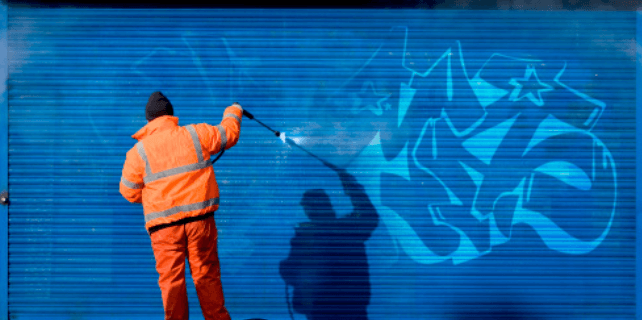
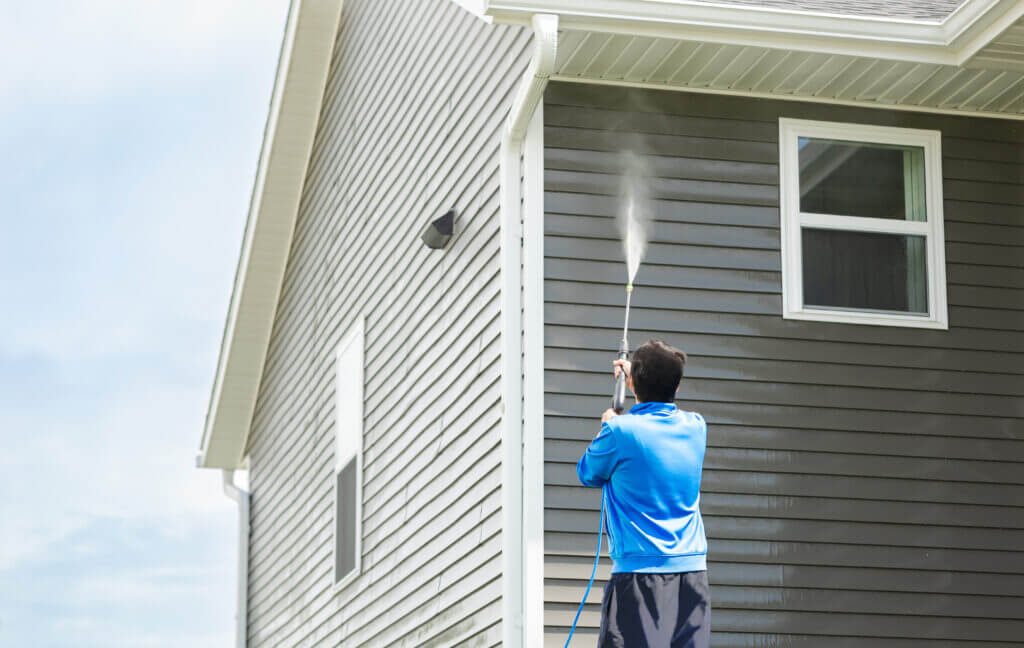
DIY vs. Professional Pressure Washing
While DIY pressure washing may seem like a cost-effective solution, there are certain drawbacks to consider. Here’s a comparison of DIY vs. professional pressure washing:
Pros and Cons of DIY Pressure Washing
When it comes to pressure washing, the option of doing it yourself (DIY) or hiring professionals both have their advantages and drawbacks. Let’s delve into the pros and cons of DIY pressure washing:
Pros:
- Cost-saving: One primary reason people opt for DIY pressure washing is to save money on hiring professional services.
- Convenience: DIY pressure washing allows you to tackle the task at your convenience without having to schedule appointments with professionals.
- Learning experience: Taking on the task yourself can be a learning experience, helping you gain knowledge about pressure washing equipment and techniques.
Cons:
- Risk of damage: Without proper training and experience, DIY pressure washing can lead to damage to surfaces such as wood, siding, or concrete.
- Time-consuming: Pressure washing can be a time-consuming task, especially if you need to be more experienced, leading to frustration and potential inefficiency.
- Safety concerns: Handling pressure washing equipment without proper knowledge of safety protocols can pose risks of injury to yourself or others.
Benefits of Hiring Professional Services
While DIY pressure washing has its merits, there are several compelling reasons why hiring professional services might be the better option:
- Expertise: Professional pressure washing services have trained technicians who possess the necessary skills and expertise to effectively clean various surfaces without causing damage.
- Time-saving: Hiring professionals saves you time and effort by entrusting the task to experienced individuals who can complete it efficiently.
- Quality results: Professionals use commercial-grade equipment and specialized techniques to deliver superior cleaning results compared to DIY methods.
- Safety assurance: Professional pressure washers prioritize safety measures, reducing the risk of accidents or damage during the cleaning process.
- Convenience: With professional services, you can sit back and relax while skilled technicians handle the pressure washing task, eliminating the need for you to invest time and energy.
Tips for Effective Pressure Washing
Whether you choose to DIY or hire professionals, following these tips will ensure a thorough and practical pressure-washing experience:
Choosing the Right Equipment
Investing in a high-quality pressure washer with adjustable settings tailored for various surfaces and cleaning needs ensures efficient and precise cleaning without risking damage. Such a versatile tool not only saves time and effort but also offers peace of mind by providing the flexibility to tackle a wide range of cleaning tasks effectively.
Preparing Surfaces for Pressure Washing
Before initiating the cleaning process, ensure the area is free from any obstacles, debris, or fragile items that might be susceptible to damage. Clearing the space of such objects minimizes the risk of accidents or breakages, ensuring a smooth and safe cleaning operation.
Techniques for Thorough Cleaning
Begin at the highest point of the surface and gradually move downward, employing broad strokes to ensure consistent coverage and avoid leaving behind streaks or patches of uneven cleaning. This method facilitates thorough cleaning by efficiently covering the entire surface area while maintaining a uniform appearance without streaks or blemishes.
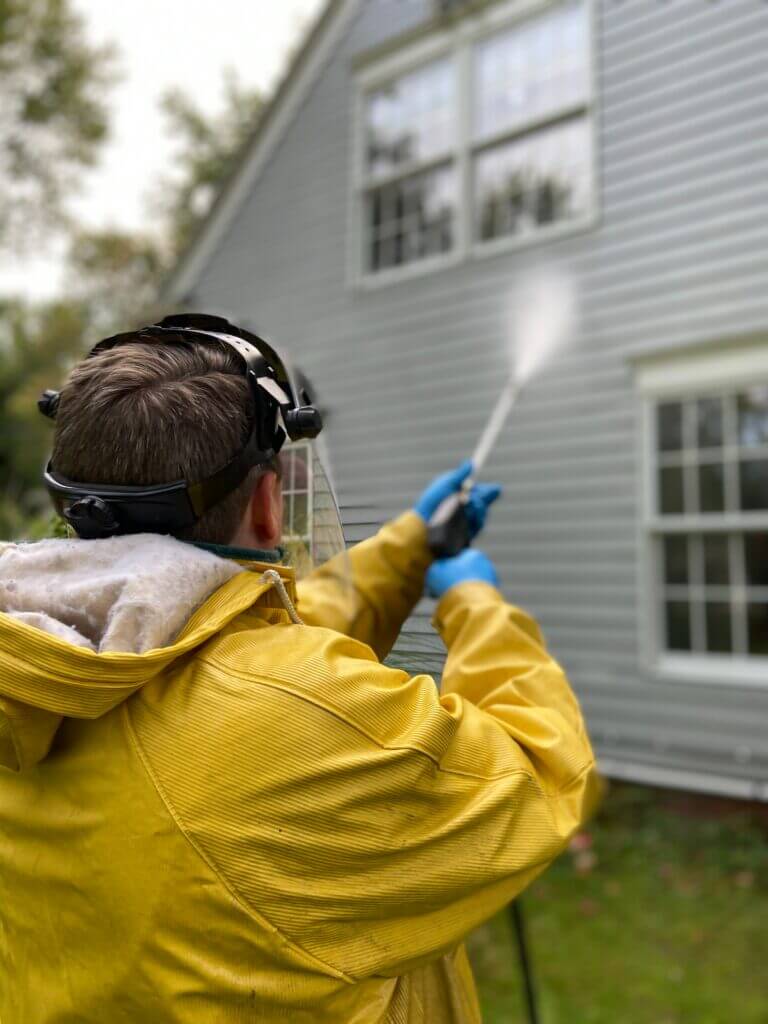
Maintaining Your Home Post-Pressure Washing
After pressure washing your house, it’s essential to implement preventive measures to prolong the cleanliness and protect your investment.
Preventive Measures to Prolong Cleanliness
A protective sealant or coating is applied to surfaces to create a barrier that repels dirt and water and prevents UV damage. This prolongs the lifespan and maintains the appearance of the treated surface. This coating acts as a shield, enhancing durability and making cleaning easier, ultimately preserving the aesthetic and structural integrity of the surface for an extended period.
Regular Inspections and Touch-ups
Regularly check your home for any accumulation of dirt, growth of mold, or signs of damage, and promptly attend to any issues to prevent them from worsening. Taking proactive steps to address these concerns will help maintain the integrity of your home and ensure a healthy living environment for you and your family.
Eco-Friendly Pressure Washing Practices
Incorporating eco-friendly practices into your pressure washing routine minimizes environmental impact while still achieving excellent results.
Environmentally Safe Detergents and Cleaners
Opt for biodegradable cleaning agents that break down naturally without harming the environment. Ensure they are non-toxic to safeguard both your home and the ecosystem. By selecting such products, you not only maintain a clean living space but also contribute to reducing pollution and promoting sustainability.
Water Conservation Methods
Choosing pressure washers with water-saving features, such as adjustable flow rates and spray patterns, allows users to customize their usage according to specific cleaning needs, effectively minimizing water wastage. By efficiently controlling water output, these features promote sustainability by conserving water resources without compromising cleaning performance.
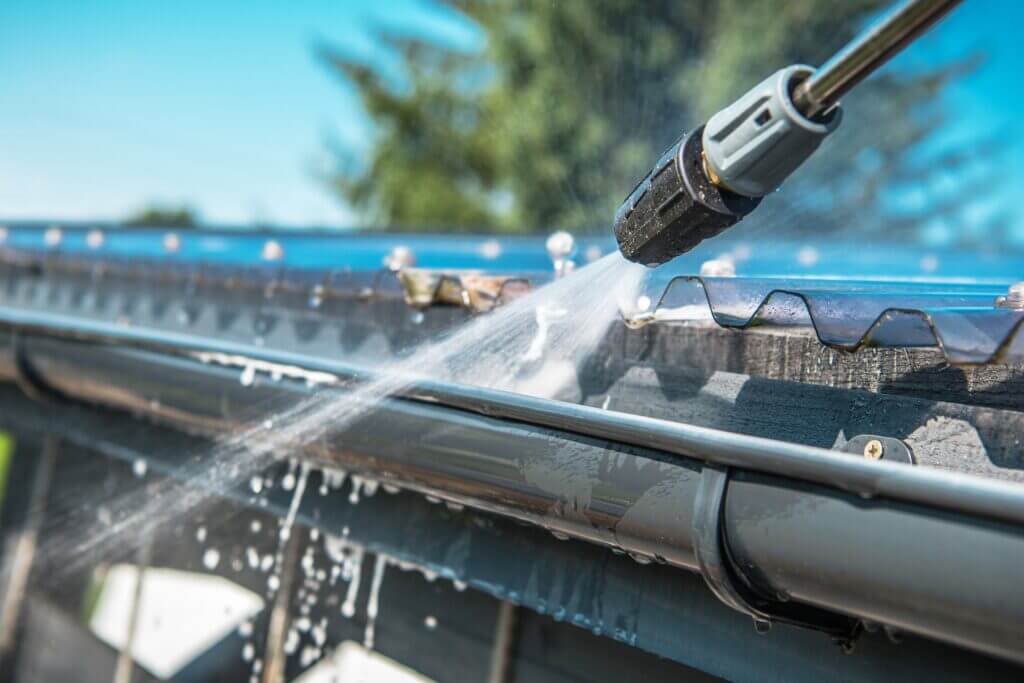
FAQs (Frequently Asked Questions)
How does pressure washing benefit my home?
Pressure washing removes dirt, grime, and contaminants, enhancing the appearance and prolonging the lifespan of your home’s exterior surfaces.
Can pressure washing damage my siding?
When done correctly, pressure washing is safe for most siding materials. However, using excessive pressure or improper technique can cause damage, so it’s essential to hire a professional or follow manufacturer guidelines.
Is pressure washing safe for all surfaces?
Pressure washing is suitable for most exterior surfaces, including siding, decks, driveways, and sidewalks. However, certain delicate surfaces may require special care or alternative cleaning methods.
How do I know if my house needs pressure washing?
Visible dirt, grime, mold, or mildew buildup are clear indicators that your house needs pressure washing. Additionally, faded paint or discoloration may signal underlying dirt or damage.
Can I pressure wash during any season?
While pressure washing is typically done in milder weather conditions, it can be performed year-round with proper precautions. Avoid pressure washing during extreme temperatures or freezing conditions to prevent damage to equipment and surfaces.
How can I prevent mold and mildew growth after pressure washing?
To prevent mold and mildew regrowth, ensure surfaces are thoroughly cleaned and treated with a mold inhibitor or protective sealant. Additionally, it improves ventilation and sunlight exposure to inhibit moisture buildup.
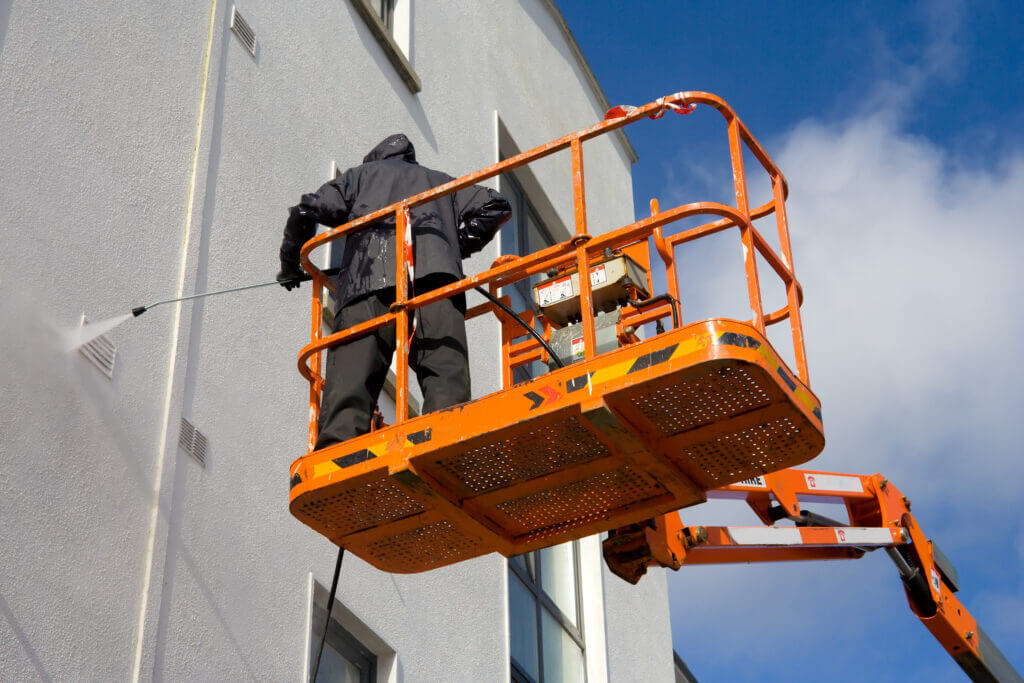
Conclusion
Regular pressure washing is a crucial aspect of home maintenance, preserving the beauty and integrity of your property. By understanding how often you should pressure wash your house and following expert tips, you can keep your home clean, healthy, and inviting for years to come.
Remember: A clean house is a happy house!
